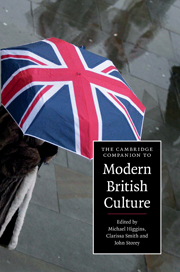Book contents
- Frontmatter
- Introduction: modern British culture
- 1 Becoming British
- 2 Language developments in British English
- 3 Schooling and culture
- 4 The changing character of political communications
- 5 Contemporary Britain and its regions
- 6 Contemporary British cinema
- 7 Contemporary British fiction
- 8 Contemporary British poetry
- 9 Theatre in modern British culture
- 10 Contemporary British television
- 11 British art in the twenty-first century
- 12 British fashion
- 13 Sport in contemporary Britain
- 14 British sexual cultures
- 15 British popular music, popular culture and exclusivity
- 16 British newspapers today
- 17 The struggle for ethno-religious equality in Britain: the place of the Muslim community
- Guide to further reading
- Index
13 - Sport in contemporary Britain
Published online by Cambridge University Press: 28 September 2010
- Frontmatter
- Introduction: modern British culture
- 1 Becoming British
- 2 Language developments in British English
- 3 Schooling and culture
- 4 The changing character of political communications
- 5 Contemporary Britain and its regions
- 6 Contemporary British cinema
- 7 Contemporary British fiction
- 8 Contemporary British poetry
- 9 Theatre in modern British culture
- 10 Contemporary British television
- 11 British art in the twenty-first century
- 12 British fashion
- 13 Sport in contemporary Britain
- 14 British sexual cultures
- 15 British popular music, popular culture and exclusivity
- 16 British newspapers today
- 17 The struggle for ethno-religious equality in Britain: the place of the Muslim community
- Guide to further reading
- Index
Summary
The cult of individual improvement
For the public-school-educated amateurs of the Rugby Football Union, it was the root of all evil. For the departing members of the Northern Union, as rugby league was originally called, it was what made the world go round.
The men who ran the Northern Union had earned their money not from inheritance or landowning but from industry and business, and 'their commitment to amateurism was further weakened by their general values', observed Eric Dunning and Kenneth Sheard in their Barbarians, Gentlemen and Players: A Sociological Study of the Development of Rugby Football. 'That is, they were more openly achievement-oriented and acquisitive, and showed a greater tendency to place money value on social relations and personal attributes.'
In 1904, nine years after splitting from its amateur cousin, rugby league changed its rules, making it possible for its players to be full-time employees of their clubs, which in turn were financially dependent on admission money paid by spectators. In effect, rugby league became a fully professional sport. It was by no means unique in this respect. Association football had been professional for almost twenty years, and prizefighters had been boxing for money since the eighteenth century. Yet the division of the two rugby codes symbolised a new age, one in which professional and amateur sports would coexist, not always easily but in a stable state that would endure for the next eighty years.
- Type
- Chapter
- Information
- The Cambridge Companion to Modern British Culture , pp. 225 - 243Publisher: Cambridge University PressPrint publication year: 2010

